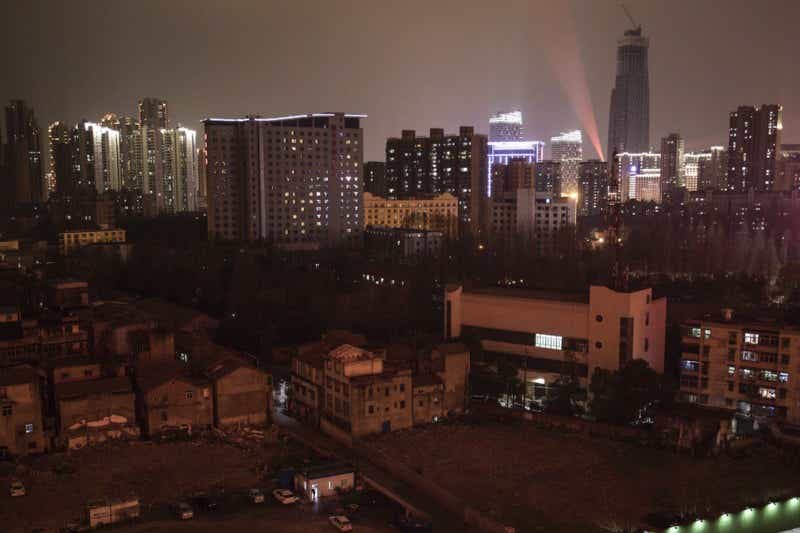One man who lived it shares his story
The latest episode of my podcast Next Question examines the COVID-19 outbreak — and features interviews from the frontlines of the coronavirus epidemic, including Yulin Yin, a Chinese-American man living in Minnesota. He was visiting family in Wuhan, China, when the region went under lockdown. Read his story below, and listen to the full episode here.
Yulin Yin lives in Minnesota with his wife, Ann, and their two daughters. In January of this year, Yulin was planning on traveling to Wuhan province in China, where he was born, for New Year celebrations with his family and friends. But in the leadup to his flight, rumors began to emerge that there was a mysterious illness in the region. His family assured him that there was “nothing to worry about,” Yulin told me. So his trip went ahead as planned, and he landed on January 20, 2020.
“I remember I was at the luggage pickup. I felt nervous definitely at that time. everybody around me were wearing masks at that time and actually it was the first time I saw N95 masks,” he explained. “When my sister picked me up [at the airport], she already told me, in Hankou, which is a little town part of Wuhan, it’s very serious there. So, she told me not to touch anything and we just go to car directly, just drive straight home.”
But the situation elevated quickly. By January 23, the Chinese government started to limit travel around Wuhan. No one was allowed to leave, and public transit was shut down.
“For the first few days I actually went out with my family to different restaurants. The third day… I woke up at 2 a.m. and I got a message from a friend in the United States, actually, saying, ‘Oh, I heard Wuhan is locked down. Is that true?’ I was thinking, ‘What do you mean locked down?’” Yulin told me. But a social media search quickly verified that traffic coming out of Wuhan was locked down.
“You’re not seeing anything coming in, but you cannot leave,” he explained. “I was thinking, ‘Wow, so there’s no train going out, there’s no flights. Can I still go by car? Should I wake up my brother asking to drive me to Shanghai somewhere so I can go home?’ I was really confused at that time.”
Yulin worried about getting back to his family in Minnesota, but he remained hopeful: “In my mind, there’s no way that the lockdown can last more than say one or two weeks. My trip was three weeks. I said, ‘Okay, just see how it goes, the lockdown may be lifted in a couple of weeks.’”
The first days of the lockdown were a strange, new normal for Wuhan residents — and for Yulin. “I remember I was just watching TV. There was one TV station… playing a soap opera. Then there’s a line, like scrolling text, talking about [what we should do]: Stay home, wearing masks.”
By January 25, just five days after Yulin landed in Wuhan, the U.S. government mandated evacuations of U.S. personnel and citizens from the region. “I was surprised, actually, when the first evacuation happened,” he recalled. “When United States evacuated all the consulate employees and staff and the family member, I got really worried. When I heard the news, it said there’s only very limited seats available for private citizens, so I tried to contact them. But at that time, the flight was already full.”
Yulin asked his wife back in the U.S. to help, and she reached out to congressional representatives from their home state of Minnesota. “They were very helpful,” he said. “They talked to the State Department, and they found out there were new evacuation flights planned. (There was… nothing in the news.) Then I registered on the State Department website. I sent an email to one email address, and then the representatives… helped to communicate with the State Department, too. That’s how I got on the list to be evacuated.”
Yulin was grateful but told me that initially, he felt guilty about leaving. “It was really tough, especially [because] my parents are older,” he shared. “But there’s really not much I could do there to even help them. They are doing fine [now] in terms of the coronavirus, but my dad is older. He fell twice already, and he just couldn’t get the care he needed.”
On February 5, Yulin landed in San Diego with the rest of the evacuees. Contingent upon getting the flight out of China was the 14-day quarantine on a U.S. military base — the price for coming home.
Now that he’s back, Yulin is reflecting on what he went through. “What I learned is that trust and information are so important. There is so much misinformation flying around on Twitter, even in the news. We have to be very, very careful to check the source. Another thing I learned is [to] listen to the experts. I’m not [an] expert in [the] virus, so I try to find experts I can trust so I can try to listen to them.”
This has been edited and condensed from the Next Question podcast. Listen here.
This appeared on Medium.com









